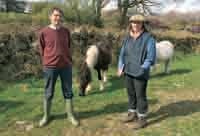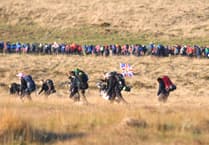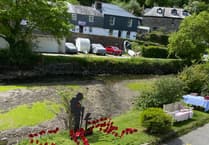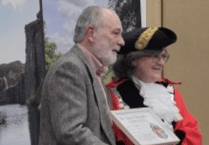THE next stage in a pioneering project to protect Dartmoor's ponies, dubbed 'ponies on the pill', is now in full swing. Thirteen ponies were given a contraceptive injection last week as part of the Friends of the Dartmoor Hill Pony's project to reduce the number of foals being born each year, which, it suggests, is becoming too many. Due to the economic downturn, demand for the ponies at sales have reduced, meaning many are being destroyed to control numbers. The Friends are attempting to control indiscriminate breeding, while allowing mares to run naturally in herds with stallions, with a contraceptive programme. Twenty-seven farmers from across Dartmoor have signed up to the trial programme, with 100 ponies being involved in total. Forty-nine ponies had already been given the contraceptive, and 13 more were injected last week. Another 38 will be injected in the coming weeks. Veterinarian Jonathan Lamming, from Dartvale Veterinary Group in Totnes, administered the injections. He said: 'It is a contraceptive injection given to the mares which stops the ovaries producing eggs. 'They are given two doses four weeks apart, then a booster after six months, and then a booster every six months for as long as it is appropriate.' Charlotte Faulkner, founder of the Friends of the Dartmoor Hill Pony, said the ponies needed to be protected from culling in the autumn because they were 'tools of ecology' — needed to control the bracken and gorse on the moor and are an attraction for tourists. She said the trial was working well so far. 'It's working pretty well, it's an experimental process at the moment. 'This group is really important because we have got a common where they can run as a proper herd.' With the other groups of ponies, because of the lack of land available for the trial, the ponies had to be kept in one place and monitored, but this group of 13 will be able to roam as they would naturally. 'The herds are being studied to ensure there are no adverse changes in behaviour. It is important to respect the social systems within the pony herds and the fabric and interaction of neighbouring herds, because that is how we use the ponies for the benefit of the eco-system. 'All projects must be carried out with sensitivity and care so we don't take away the value the ponies have to the flora and fauna of Dartmoor and each other.' The Friends group is working with farmers in Wales during the trial, who are already using the next step of administering the contraceptive through a dart gun, which causes less stress to the animals and is more efficient, enabling the ponies to be injected out on the common rather than having to be penned in one place. Last week's group of thirteen ponies had to be walked along the road from their patch of land to an area of land lent to the Friends for the trial. Charlotte said: 'Because we weren't successful in securing a plot of land to do the trial on, it has been more expensive and more time consuming having to go to different areas. 'The whole thing could have been done in one day, but so far we have done it in three days and have a couple more days left to do.' Charlotte expressed thanks to all the support they have received so far, including the Dartmoor National Park Authority and private donors who are helping to fund the project at the moment. In the future she hopes they could have a scheme where people could 'sponsor a pony not to have a foal'.

Vet Jonathan Lamming and Charlotte Faulkner are pictured with some of the ponies ‘on the pill’.
More About:




Comments
This article has no comments yet. Be the first to leave a comment.